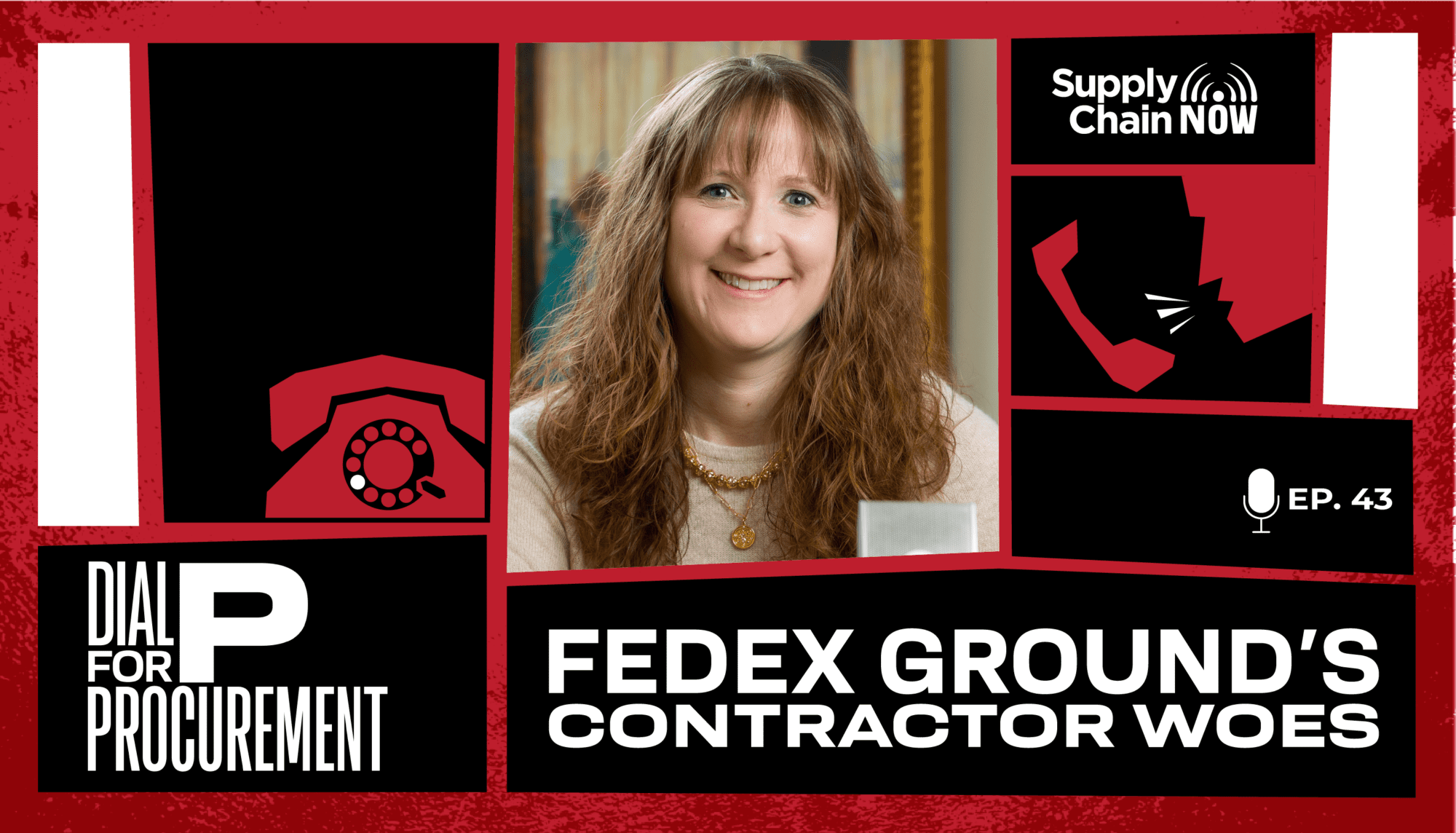Intro/Outro (00:01):
Welcome to Dial P for procurement, A show focused on today’s biggest spin supplier and contract management related business opportunities. Dial P investigates the nuanced and constantly evolving boundary of the procurement supply chain divide with a broadcast of engaged executives, providers, and thought leaders. Give us an hour and we’ll provide you with a new perspective on supply chain value, and now it’s time to dial P for procurement.
Kelly Barner (00:31):
If you are a regular Dial P listener, you know I always call for input. I want comments, ideas, reactions, differing points of view. After all, we’re not going to be able to solve today’s toughest challenges if we don’t all put our best ideas on the table. Shelly Phillips is a fellow supply chain colleague and a very active Dial P listener. In August, she reached out to me on LinkedIn with a video link. It was about the trouble hitting the news between FedEx and some of their ground contractors. She wrote in a note, I just happened to catch this short clip. You might already be aware of this, but I thought of you. This could really be a holiday mess. Now, I’m going to be totally honest with you. I did not know just how dependent FedEx ground is on independent service providers. Once I did, I started digging to learn more and what I found was a textbook dial piece subject.
Kelly Barner (01:35):
This situation is a mess. It’s ongoing, it’s newsworthy, and yet most of the meaningful details are being left out of the headlines. It’s an unbelievably complicated situation, so huge thanks to Shelly for reaching out and suggesting this story as well as to everybody that regularly participates in discussions about these episodes. In this episode of Dial P, I’m going to review the current status of the FedEx ground contractor dispute and maybe dig back in time a little bit to figure out where it all began. We’re gonna talk about who is Spencer Patton, the man that has emerged as the leading voice of the contractor pushback. We’ll talk about what the contractor are looking for and what FedEx FedEx’s response has been, and then we’re gonna wrap up by looking at how this particular saga appears from a higher altitude. When we look at it from a macro perspective, what can we learn about how the business operates and what connections can we make between this story and FedEx’s recent financial disclosures?
Kelly Barner (02:44):
Before I go any further, let me introduce myself if you do happen to be a new Dial P listener. I’m Kelly Barner. I’m the co-founder and managing Director of Buyers Meeting Point. I’m a partner at Art of Procurement and I’m your host for Dial P here on Supply Chain. Now, I’m constantly scanning the news for complex articles to discuss things that are interesting but may have escaped people’s notice. I also follow these stories beyond the headlines, and I stay on top of them until they go cold or reach a resolution. We release a new episode of Dial P every Thursday, so be on the lookout for future episodes and don’t forget to check out some of the past episodes as well. Before we get back to FedEx Ground, I have a favor to ask If you find value in the time we’re about to spend together, find a way to engage, give us a review on iTunes, share some stars or an engagement emoji on LinkedIn or Twitter or Facebook.
Kelly Barner (03:47):
Wherever you found this, there’s a way for you to engage. You can even take this episode and send it directly to a colleague that you think would benefit from hearing it. I’m always grateful for your interest and attention, and if there’s any question as to whether I listen to my listeners, you have episodes like this one and the Baby Formula episode I recorded back in May at the suggestion of Maureen Walsh Schlager from Vector Global Logistics. Thank you for continuing to play an active part in this podcast. All right, let’s get back to FedEx Ground. They have 60,000 national roots and they work with 6,000 contractors, which are also sometimes referred to as independent service providers or ISPs. These contractors provide delivery, pickup and line haul services, and they’re responsible for hiring their own employees and investing in their own equipment. Being a contractor is different from being a franchisee, mostly in that it limits their visibility into FedEx’s corporate doings and it lowers their negotiating leverage.
Kelly Barner (04:56):
The trouble here has been brewing for long before it started to make recent headlines, and some of the roots of the current difficulty are actually to be found in the history of the business itself. FedEx Ground began in 1985 as roadway package service or rps. They used a contractor only model to keep driver pay low and avoid offering full benefits because they were trying to compete with UPS’s price point. At the time in 2000, FedEx saw an opportunity, so they bought R ps and rebranded it as FedEx ground. Back then, most of the shipments were between businesses or they were commercial route and there were multiple deliveries per stop. Enter Amazon. FedEx was forced to adjust the ground model by having their ground contractors take on residential as well as weekend deliveries. Now, not only did this change the days and hours that they had to operate, it altered the profitability of the model.
Kelly Barner (06:02):
Over time, there have been a number of changes where services that were provided by contractors are the providers versus FedEx responsibility sort of shifted around. A notable example happened in 2021 when FedEx Ground contractors took over final mile ground delivery from the US Postal Service. You might have actually used this as a consumer. It used to be known as FedEx Smart Post where the mailman would bring your package for the final mile that became FedEx Ground Economy. They also took over all Saturday and Sunday deliveries, nearly all of which are residential. These residential deliveries are both less profitable and more expensive because of the distance between stops and because less things are dropped off each place. Contractors are paid 40% less for residential deliveries, then they are for commercial deliveries, and they cost more to carry out. That higher cost is actually acknowledged by FedEx in their service guide.
Kelly Barner (07:07):
Their 2021 service guide lists a $4 and 35 cents surcharge per package that applied to residential deliveries. Now, even though that seems substantial per package, it was also determined before gas prices rose to their current rate, and then there’s this issue of data and demand planning during the 2021 holiday season. FedEx overestimated the volume of packages that they would be moving according to supply chain dive, and because the contractors don’t have direct access to the data, they had to trust FedEx’s projections and take their word for it. We know now looking in the rearview mirror that consumers were in the process of transitioning their spending from e-commerce shopping where packages had to be delivered to their homes over to some of the experiences that they had missed out on during the height of the pandemic. Money started being allocated to travel and dining out and entertainment, so FedEx Grounds Contractors ended up hiring and investing in equipment in ways that they didn’t actually need, partially because they didn’t have visibility into the data, and while fuel costs may currently be down month over month, according to cnn, they are still up 52% since last year.
Kelly Barner (08:27):
The overall package volume has been down since January of 22 with all of those costs up, so you can see where this is not a sustainable situation. CNN also reports that 30% of these contractors are at risk of financial distress. Driver wages are up 37%. The cost of trucks is up 30%, and in addition to that, the contractors are competing with FedEx to hire the same drivers. The mix of shipments change during the pandemic with residential surging compared to commercial, meaning that it’s fallen out of alignment with the original RPS profitability model, and we’re not really on a trajectory for things to go back to the old normal anytime soon. Enter Spencer Patton. He is the man who has become the public or human, you might say, face of the friction between FedEx Ground and their contractors. He is the founder and president of Patent Logistics located in Nashville, Tennessee, and your perspective on him is probably connected to your view of FedEx.
Kelly Barner (09:38):
For instance, freight waves referred to him in one headline as a quote, militant driver contractor. Spencer Patton is FedEx ground’s largest contractor. He has 275 trucks, 225 drivers, and his territory covers 10 states in the Midwest. In 2021, his operation delivered 6.5 million packages representing half a percent of FedEx ground 60,000 roots. When he started as a FedEx contractor 10 years ago, he was making a 10% profit. Now he reports to losing between five and 10%. In addition to patent logistics, he owns a contractor consultancy called Root Consultant. On August 26th, 2022, FedEx sued root consultant and canceled their ground contract just a few hours later. Now the trucks are parked and the drivers are out of work. The FedEx lawsuit, which was filed in federal court alleges that Pat was creating a fictionalized crisis among other ground contractors in order to promote his consulting services. The company is looking for immediate injunctive relief, which means he has to stop accusing FedEx of things, and they also want monetary damages.
Kelly Barner (11:02):
You can bet that’s going to be a large number. Part of what determined the timeline around this actually refers to Route Consultants 2022 Contractor Expo, which was hosted in Las Vegas on August 20th and 21st. 60% of FedEx Grounds contractors attended the event. That’s over 3,500 companies, and that’s why just a few days later on August 26th, the lawsuit was filed and the contract was canceled. Spencer Patton has been very outspoken and he’s even calling for a Purple Friday this year instead of a Black Friday. Encouraging contractors to make their collective leverage known by affecting ground deliveries, FedEx views Patent is trying to position himself as a bargaining representative for the whole group of contractors. They seem to be looking at it as potential evidence that a union could be brewing. Now, that does constitute a breach of his contract with FedEx and contractors are not allowed to strike.
Kelly Barner (12:08):
That actually constitutes a violation of antitrust law, so these contractors are kind of trapped in a situation where they both can’t bargain collectively, can’t necessarily make a profit and can’t necessarily get out of the contract if they might want to. At this point, you might be thinking that FedEx is the bad guy here, and I’m not saying that they’re not, but I’m not saying that they are either. Remember, we don’t do simple here on Dial P. A key point of contention is how fuel surcharges are handled. FedEx collects those surcharges from customers and the contractors don’t believe those are being fairly allocated and pass along, but that doesn’t mean FedEx isn’t doing anything to help the contractors deal with higher fuel costs. They allow ground contractors to access FedEx fuel hubs, which offer reduced prices, and they also provide them with access to an app that flags low cost fuel locations in each contractor’s operating area.
Kelly Barner (13:12):
Most of these contracts last between 12 and 18 months, and FedEx has reported that they have allowed a record number of renegotiations in recent months to adjust to some of the higher costs and lower volumes. They also share information with contractors about how to improve the efficiency of their delivery route and how to plan out more optimal root lengths, but all of this may not be enough. The number of FedEx contractor businesses up for sale has increased by 65% in a year and asking prices are down. They have decreased by an average of 8% as a percentage of revenue. Now, I promised a look at the macro FedEx’s financials aren’t exactly rosy in and of themselves. On Friday, September 16th, they announced that they had missed their quarterly revenue expectations. FedEx ground alone came in 300 million below forecast. The company has pulled back the annual revenue estimates that they issued in June in order to redo them based on new data and updated assumptions.
Kelly Barner (14:27):
They have also announced that they will close five corporate locations, 90 retail locations, and ground multiple aircraft. They’re also suspending Sunday deliveries in some rural areas, and all of this has to do with offsetting declining package volume. The market definitely took notice. Shares of FedEx fell 19% in after hours trading and felt 21% the following day. That represents the biggest one day drop in FedEx share value. Since they went public in 1978, their fiscal year, which ended in May of 2022, lists their operating profit as being down by 17%. Even though revenue has sorted 60% since the start of the pandemic costs are just that high. Of the three main operating units, FedEx Ground was the least profitable, so FedEx Express and FedEx Freight did better. So even if FedEx ground contractors decide to stay with the company, they may not be profitable again in 2023.
Kelly Barner (15:38):
We have to ask the question, how long can this last consumer goods companies like Newell Brands and Scott’s Miracle Grow have noted that retail orders are down and retailers like Walmart and Target are stuck with a glut of inventory. They don’t want or wishes misaligned from a seasonal perspective. With all of this coming up the works, there are less things to move, so shipping volumes are down and overhead costs are both up and being redistributed across less packages. The pressure on the system and the model for FedEx ground with the contractors can only build from here. It’ll be interesting to see if Purple Friday materializes on November 25th, you can be sure I’ll be watching now. That’s my point of view on this situation, but I’m interested in hearing what you think as well. Let’s work together to figure out the best solution. Thank you for listening into this episode of Dial P for procurement, so this is where your work begins.
Kelly Barner (16:48):
I want you to join the conversation and let me know what you think. Will there be a Purple Friday, FedEx ground contractor uprising, or will it just sort of blow over and fall off the front pages? Is the current financial and operating model sustainable or does it need to be readjusted given the new mix of residential commercial seven day a week schedules, fuel costs, surcharges? Does it need to be revisited? What may FedEx corporate do to protect the profitability of their ground unit? And of course, the most interesting question of all. What will Spencer Patton do next? Find me find Dial P on LinkedIn and let me know what you think. Until next time, I’m Kelly Barner. On behalf of Dial P for procurement and supply chain now, have a great rest of your day.
Intro/Outro (17:43):
Thank you for joining us for this episode of Dial P for procurement and for being an active part of the supply chain now community. Please check out all of our shows and events@supplychainnow.com. Make sure you follow Dial P four procurement on LinkedIn, Twitter, and Facebook to catch all the latest programming details. We’ll see you soon for the next episode of Dial P four. Procurement.



